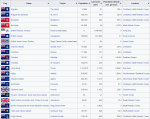 The 2024 United States presidential election was the 60th quadrennial presidential election, held on Tuesday, November 5, 2024. The Democratic ticket of Governor Jared Polis of Colorado and Senator Raphael Warnock of Georgia defeated the Republican ticket of Senator Ted Cruz of Texas and Senator Thom Tillis of North Carolina. Polis took office as the 48th president, and Warnock as the 50th vice president, on January 20, 2025. In doing so, Polis became the first LGBT president in U.S. history, whilst Warnock became the second African-American to serve as vice president.
The 2024 United States presidential election was the 60th quadrennial presidential election, held on Tuesday, November 5, 2024. The Democratic ticket of Governor Jared Polis of Colorado and Senator Raphael Warnock of Georgia defeated the Republican ticket of Senator Ted Cruz of Texas and Senator Thom Tillis of North Carolina. Polis took office as the 48th president, and Warnock as the 50th vice president, on January 20, 2025. In doing so, Polis became the first LGBT president in U.S. history, whilst Warnock became the second African-American to serve as vice president. Ascending to the presidency after Joe Biden's resignation from office in April 2023, Kamala Harris initially announced her intention to run for the Democratic nomination in May 2023. However, poor polling numbers and an expectation that she would struggle to win an election to the presidency led to Harris withdrawing from the race in October 2023. The Democratic primaries were competitive, with Polis emerging as the nominee ahead of former Transportation Secretary Pete Buttigieg, his closest rival for the nomination. Former President Donald Trump was widely expected to be the Republican nominee and he announced his campaign for a second, non-consecutive term in May 2023. However, Trump suffered a heart attack in October 2023 and, despite initial plans to continue his campaign, eventually withdrew in December 2023. The Republican primary was even more competitive and saw Cruz as the frontrunner alongside Arkansas Senator Tom Cotton, former Vice President Mike Pence and Texas Governor Greg Abbott. Ultimately Cruz was victorious despite a fierce and bitter fight with Cotton and Pence. Polis selected Warnock as his running mate, whilst Cruz selected Tillis.
Polis and the Democrats made divided government key to their campaign, calling on voters to support Democrats across the ballot in Senate and House races in order to create a mandate for Polis's "Work for America" agenda, which consisted of key economic and political changes to bring the country together after the turmoil and divisiveness of the Trump, Biden and Harris presidencies. The Cruz campaign tried to focus on cultural issues, warning that Polis would increase federal taxes, pack the Supreme Court and expand access to abortion. Although not officially endorsed or repeated by the Cruz campaign, many Cruz supporters launched homophobic attacks on Polis, resulting in a bitter and nasty campaign that dominated the airwaves throughout the fall of 2024. Four debates were held, three between Polis and Cruz and one between Warnock and Tillis. The Democrats were widely judged to be the victors of all four.
Polis secured a victory of 359 electoral votes to Cruz's 179, winning 29 states plus the District of Columbia and Nebraska's second congressional district. Polis flipped a number of states won by the Republicans in 2020, including Florida, Iowa and North Carolina, despite Tillis's appearance on the Republican ticket. For the first time since 1964, the Democratic candidate won the state of Alaska in a presidential election, with Polis narrowly taking the state by a margin of 0.75 percentage points.
Unlike in 2020, where the race was not called for a number of days due to the counting of postal ballots, networks called the race for Polis on election night. Despite this, Cruz refused to concede the election that evening, with some supporters suggesting voter fraud was prevalent in key states, despite a lack of evidence for these claims. Ultimately Cruz did eventually concede the election on November 7, although he refused to do so with a traditional phone call to the other candidate, instead opting to put out a statement on Twitter acknowledging Polis and Warnock as the victors.
Alongside the victory in the presidential election, the Democrats also took both back both chambers of Congress, giving Polis a unified legislature to work with as president.










